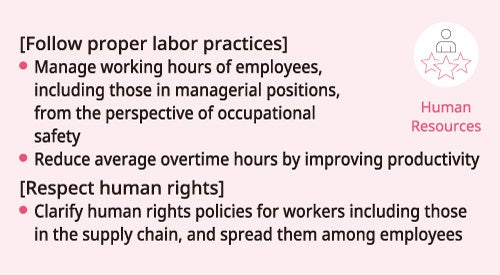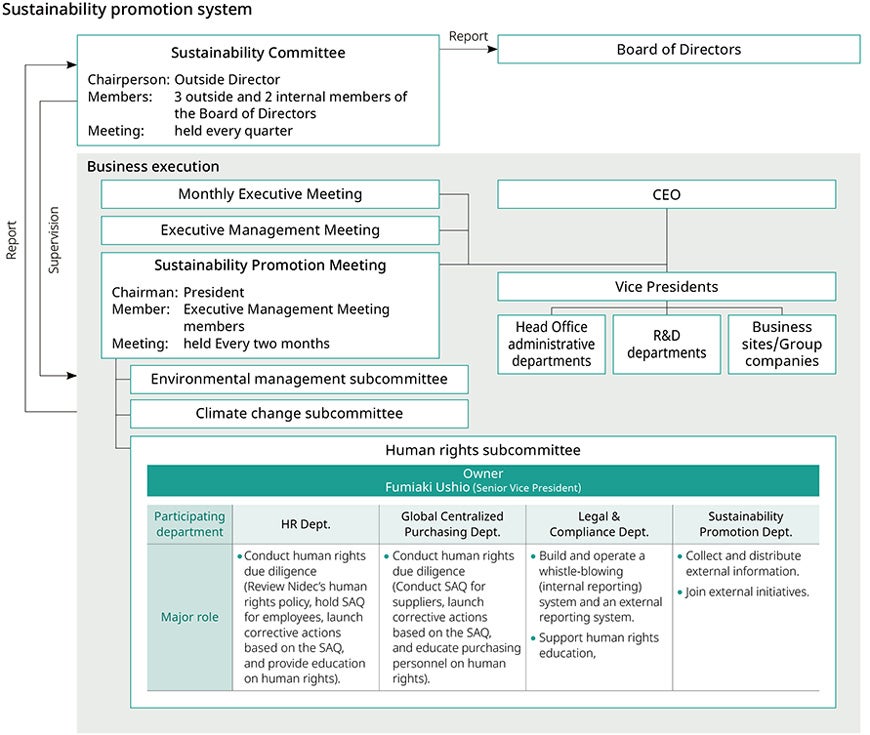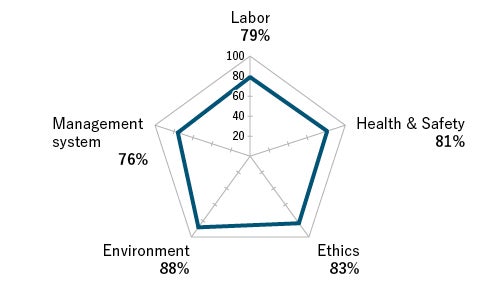S/Society
Human Rights and Labor Practices
Basic stance
Recognizing the importance of considering human rights in global business environments, Nidec responds to diversifying human rights-related issues in line with relevant international guidelines. The Nidec Group CSR Charter provides for respect for human rights, while the Nidec Group Declaration on CSR Conduct, which complements the CSR Charter, prohibits forced labor, child labor, and discrimination and inhumane treatment and guarantees proper wages, work hours, non-work days, leave, freedom of association, and the right to collective bargaining. In 2021, we established the “Nidec Group’s Basic Policy on Human Rights,” which organizes our stance and initiatives regarding respect for human rights.
Most of the labor and ethical problems arising at workplaces these days are said to be attributable to inadequate management of human rights. Being fully aware that we are responsible for not only human rights issues inside our business sites but also labor and ethical issues arising in our supply chains, we will endeavor to create safe and secure workplaces where diverse human resources can play an active role.
Click here for more details on the Nidec Group’s CSR Charter and Declaration on CSR Conduct.
The Nidec Group’s Basic Policy on Human Rights
Fundamental philosophy
As a company that realizes the importance of consideration to human rights in a global business environment, Nidec supports “the UN Guiding Principles on Business and Human Rights,” “the UN Global Compact,” “the UN Universal Declaration of Human Rights,” “the ILO Declaration on Fundamental Principles and Rights at Work,” “Children’s Rights and Business Principles,” and other international guidelines, and promotes group-wide efforts on respecting human rights.
Scope of application
This Policy applies to all executives and regular employees that work for the Nidec Group. We urge our business partners and suppliers to support and comply with the Policy as well, to promote our efforts on respecting human rights in cooperation with them.
Action agenda for human rights
We respect each person’s human rights, and do not discriminate anyone for any reasons. We eliminate forced and child labor, consistently abide by individual countries’ and regions’ labor-related laws and regulations and the spirit thereof, and aim to create a discrimination-free work environment where employees recognize each other’s personality, and respect human rights.
<Specific action agenda>
1. Respect for human rights
We respect each person’s human rights, and eliminate any and all kinds of discrimination based on race, nationality, ethnicity or national origin, color of the skin, gender difference, sexual orientation, gender identification, religion, job rank, age, disabilities, pregnancy, marriage history, political party affiliation, labor union membership, etc. In addition, we place importance on a vigorous and diverse working force, and eliminate discrimination in job recruitment, employment, and the workplace, to secure equal opportunity and fairness in employee treatment.
2. No forced labor
We employ all of our employees based on their free will, and do not force them to work against it. Likewise, in our supply chain, we do not tolerate the use of labor force from forced, bonded or slave labor, or human trafficking. In addition, we do not allow anyone to retain, damage, or confiscate any employee’s passport, work permit, other identification certificates, or any other immigration documents, or to refuse reference to such documents by the employee him-/herself.
3. No child labor
We strictly observe local laws and international guidelines on child and young labor. We set our company’s minimum working age to whichever is higher of the one stipulated in such laws, or the one mandated by the International Labour Organization (“ILO”) (15 years old). In addition, we monitor our workplaces to ensure that no workers under age 18 are subject to dangerous, night-time, or overtime work.
4. Proper wages
We satisfy all legal requirements related to employee compensation, including minimum wage, overtime compensation, and statutory benefits. Furthermore, we seek to pay living wages that exceed those requirements. In addition, we do not conduct any illegal or improper disciplinary wage reduction, and, in a timely manner, notice a payment statement that accurately describes detailed information on the compensation for the labor provided by the employee.
5. No harassment
We prohibit, and launch measures to prevent, sexual, power, gender, maternity, childcare, nursing-care-leave, or any other form of harassment, nuisance, abuse, and all the other inhumane treatments against our employees, partner companies, and others.
6. Securing safety and health in the workplace
By working with the company and employees, we secure safety and health for our employees, and aim to create a work environment where they can fully demonstrate their abilities.
7. Work hours and holidays/vacation
We satisfy all legal requirements on overtime work hours and maximum work hours. In addition, we will implement corrective measures if any employee’s weekly work hours, including overtime work hours, should exceed 60 hours chronically. Furthermore, unless otherwise required by local laws, we provide our employees with at least a day off every week, and other statutory annual paid days off.
8. Respect for diversity
We strive to create a work environment where our employees recognize each other’s personality, and where diverse people can demonstrate their abilities through collaboration.
9. Freedom of association and collective bargaining rights
We respect our employees’ rights to form or join a labor union freely, collecting bargaining rights, and rights to attend a peaceful assembly, while respecting their rights not to be involved in such activities as well. In addition, we ensure an environment where our employees or their representatives can exchange their opinions with our company’s management on working conditions and business operations without concern for discrimination, retaliation, intimidation, harassment, etc.
10. Education and training
We constantly hold education and training sessions on various domestic and overseas human rights issues to help all of our executives and regular employees understand this Policy, and entrench it in our group.
11. Information disclosure
We use our official website and other means to properly disclose information on the details and results of our activities on respecting human rights.
12. Remedy and relief
If it becomes clear that our business activity has incurred or encouraged any negative impact on human rights, we will strive to rectify the issue, while building a practical complaint-handling mechanism to enable an appropriate remedy.
13. Dialogue with our stakeholders
We talk and discuss with our various internal and external stakeholders to evolve our efforts based on this Policy.
Established: November 30, 2021
Revised: November 29, 2024
Mitsuya Kishida
Representative Director and President CEO (Chief Executive Officer)
Nidec Corporation

Target
Materiality

Structure and Initiatives
Nidec’s approach to human rights risks
We adhere to the Nidec Group’s Basic Human Rights Policy to uphold international human rights-related guidelines, and make group-wide efforts to promote initiatives to respect human rights. As part of our human rights due diligence process, we: (i) assess impacts on human rights, (ii) discontinue, prevent, and mitigate negative impacts, (iii) monitor human rights, and (iv) disclose relevant information.
1. Assessment of effects on human rights
The Nidec Group’s Basic Policy on Human Rights stipulates that we strive to advance our actions to respect human rights, including those to identify human rights-related issues via dialogue and discussion with our stakeholders. Specifically, we at the Nidec Group conduct human rights impact assessment to identify and evaluate our business activities’ negative impact on human rights. As part of our engagement with our employees and suppliers to identify areas and regions with large risks of negative impact, we conduct self-assessment (SAQ) on the Nidec Group and its supply chain. In FY2023, we launched a SAQ on approximately 300 of the Nidec Group’s business bases. We requested a total of more than 800 suppliers in Asia and elsewhere of our supply chain to conduct a human rights-related SAQ, to survey and assess their current conditions. Based on the supply chain-related information from the SAQ, we evaluate risks in two categories of: the degree of seriousness of actual negative effects on human rights; and the possibility of their occurrence, to prioritize our actions. Likewise, we identify human rights-related risks in areas outside our supply chain.
For more details on Nidec’s responsibility for its entire supply chain, click here.
2. Stopping, preventing, and alleviating negative impact
Human rights promotion system
The Nidec Group discontinues, prevents, and mitigates negative impacts on human rights via daily activities by the Sustainability Promotion Meeting, chaired by Nidec Corporation’s President, and by the Human Rights Subcommittee, which comprises departments in charge of human rights issues. The Human Rights Subcommittee’s actions are supervised by the Sustainability Committee, chaired by Nidec Corporation’s Board of Directors, to which reports are submitted regularly. In addition, reports to the Sustainability Committee are submitted to the Board of Directors by the Committee’s chair.

For more details on Nidec’s management system, click here.
Human rights training
Training on the Nidec Group’s Basic Policy on Human Rights
To discontinue and prevent negative impact on human rights at the Nidec Group, we annually launch activities to raise awareness on human rights in observance of International Human Rights Day and Human Rights Week. Since FY2022, we have been holding training sessions based on the Nidec Group’s Basic Policy on Human Rights for all Nidec Group employees (E-learning sessions are available for employees in Japan).
Harassment training
In the Nidec Group’s Basic Policy on Human Rights, we stipulate the ban on harassment, and hold compliance seminars, including those on harassment, for managerial and other employees of the group. FY2024 saw compliance seminars on work hour management and harassment held for Nidec Corporation’s and other Nidec Group companies’ executives and HR personnel in charge of harassment-related consultations.
Internal reporting (whistle-blowing) system
The Nidec Group has in place a whistle-blowing system for relief from actual and possible human rights abuse. Of the 103 whistle-blowing cases in FY2023, 34 of them were harassment-related. If any specific action is required, we hold interviews with those concerned, and launch other fact-checking actions and investigations to prevent disadvantageous treatment of whistle blowers, to take proper corrective and preventive actions.
For more details on Nidec’s internal reporting system, click here.
Anti-discrimination actions
The Nidec Group realizes its diversity as the source of our competitiveness, and stipulates the removal of all kinds of discrimination in the Nidec Group’s Basic Policy on Human Rights. Nidec Group employees must experience diverse values, enjoy and utilize their differences to the fullest extent. By realizing the importance of doing so, we successfully nurture a corporate culture that embraces diversity, and prevent all types of discrimination of people based on race, nationality, ethnicity or national origin, skin color, gender differences, sexual orientation, gender identity, religion, job organization, age, presence/absence of disabilities, pregnancy, marriage record, political party membership, labor union membership, and any other reasons. We hold workshops for Nidec Group employees in and outside Japan to prevent the aforementioned types of discrimination.
3. Monitoring
Self-assessment
The Nidec Group conducts self-assessment (SAQ) for approximately 300 of its business bases (including new business bases and those that have newly joined the group via M&A) and major suppliers, to, among other purposes, prevent child and forced labor, to rectify potential human rights-related risks and prevent such risks from materializing. Our SAQs include the following questions.
Questions (samples from internal SAQ)
- - Does your company inform its employees of Nidec’s global hotline service so that they can voice their opinions comfortably?
- - Does your company ban any and all kinds of discrimination that violates national and regional laws and regulations that apply to your company (i.e., discrimination based on the individual employees’ regions or characteristics such as gender, race, nationality, and age, or the recognition of any of them) and harassment (including sexual harassment)?
Based on the SAQ’s results, we launched the following specific risk-mitigating measures:
Corrective actions (examples of those launched internally)
- - Put up posters on the Nidec Global Hotline at overseas business bases that had failed to inform their employees fully of the whistle-blowing system; and
- - In the work rules, stipulate the ban on harassment at overseas business bases whose work rules had not provided for this ban.
Third-party Audit
In the Asian region, where more than 70% of Nidec employees work and which is regarded as a high-risk region based on the Global Rights Index of the International Trade Union Confederation (ITUC), we regularly conduct an audit based on our internal standard, which is based on the RBA Code of Conduct*, through a partnership with a third-party certifier. With respect to the human rights of the employees of major production factories in Asia, we strictly check them based on the audit items of the seven aspects including “freely chosen employment,” “young labor,” and “work hours.”
The audit, intended for major production bases in Asia and Southeast Asia, where an especially large number of Nidec employees work, was held a total of 16 times in FY2018 at 11 production plants in China, Thailand, and Vietnam.
Conformance ratio (FY2018)

Based on the audit results, we launched the following improvement actions:
- Produce document on how to prevent problems from recurring.
- Optimize our work hours and wage system.
- Advance the quality of education on how to prevent chemical spills.
- Improve the level of labor sanitation-related knowledge.
In addition, the sites in Thailand, Vietnam, and other countries launched other actions including the examination of measures, such as work automation, to reduce overtime work hours, better anti-disaster measures, preparing policies in local languages, and making safety management procedures and other documents.
*RBA (Responsible Business Alliance) Code of Conduct: A code of conduct, established by the electronics industry, on business activities throughout the supply chain.
Nidec regularly reports these actions on human rights due diligence in its sustainability promotion meeting.
4. Disclosing information
Nidec reports information on its human rights due diligence on its corporate website, integrated report, and securities report for all of our stakeholders to see.
Workshops, joining initiatives, and having inter-company collaboration
As a member of the UN Global Compact, the Nidec Group has been participating in workshops and other events since FY2016, actively exchanging information with the outside, and promoting human-rights-friendly business activities, including those for the proper labor standards. In other activities, we constantly meet HR personnel of various industries, and provide our feedback on information from those events to our group, to realize proper labor practices, and make diversity-friendly organizations.
Actions for labor practices
We stipulate our policy on wage, work hours, days off, and other labor practices in the Nidec Group’s Basic Policy on Human Rights, whose Japanese original version was translated into English, Chinese, and other languages for our global workforce to understand the policy in detail.
Work hour management (labor risk assessment)
To manage our employees’ work hours, discussions are underway especially in Japan to optimize the number of people in the management. In addition, to observe Article 36 of Japan’s Labor Standards Act (the so-called “36 Agreement”), we micro-manage our employees’ work hours to avoid risks of excessive labor, and report to and work with individual organizations concerned. Further, especially with respect to employees who are expected to work long hours, we notify those whose work hours have reached a designated limit in the middle of the month and their supervisors, and request them to adjust such employees’ workload based on sufficient communication, to optimize work hours and reduce excessively long work hours.
